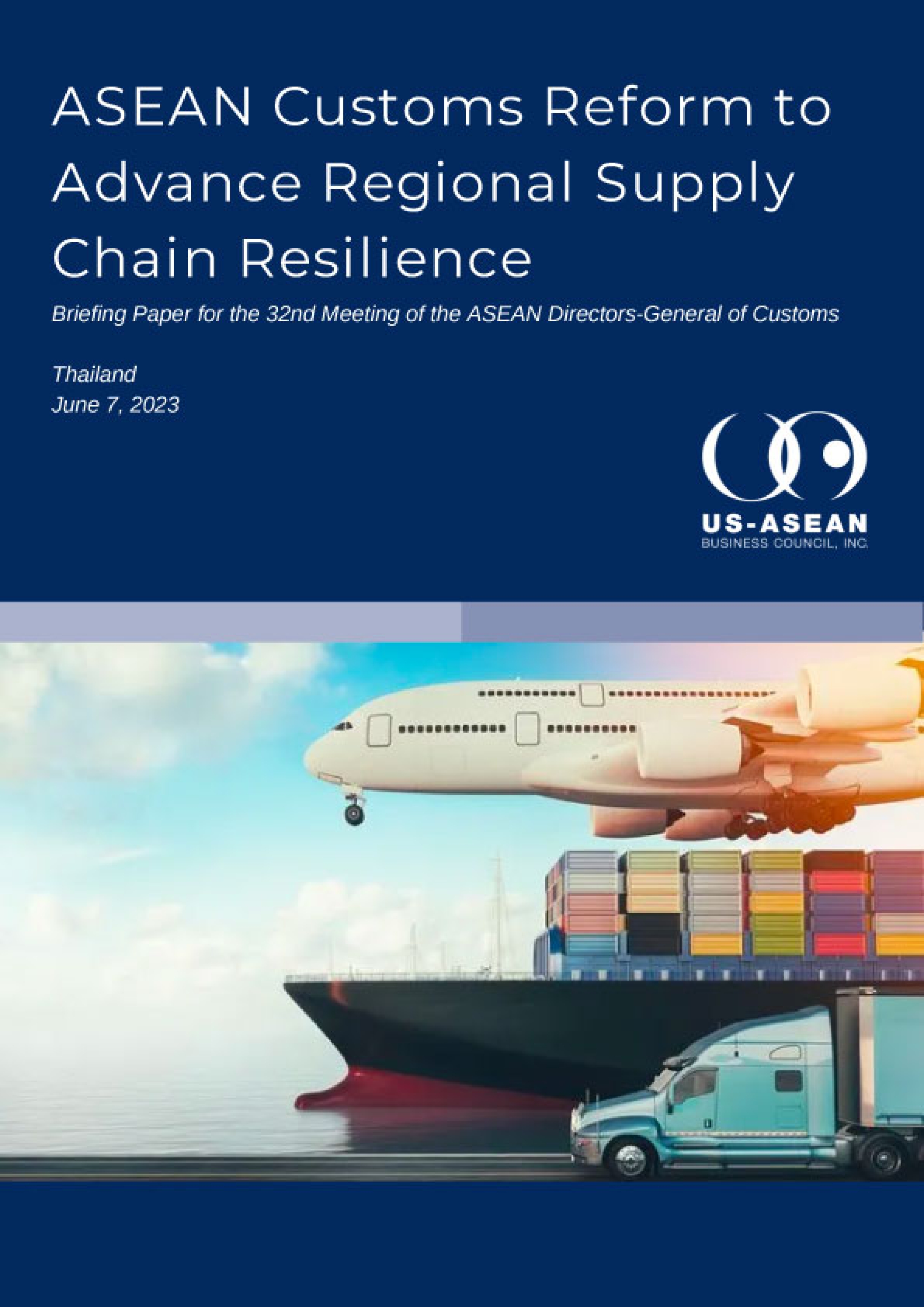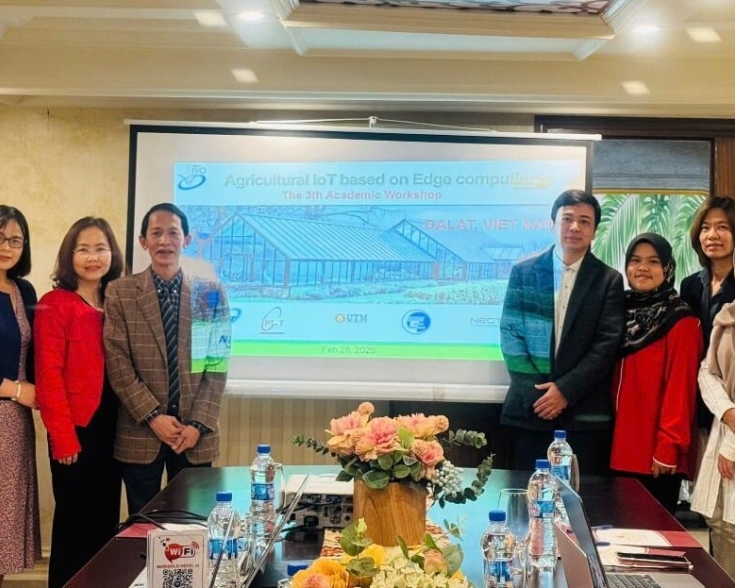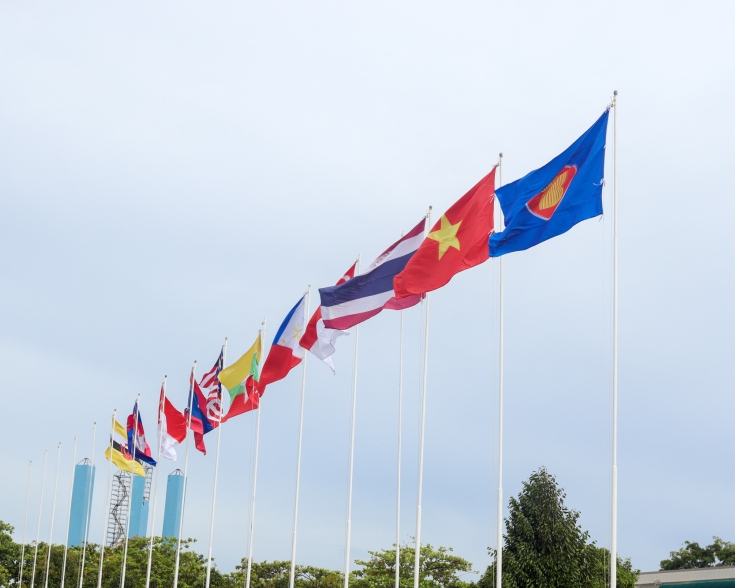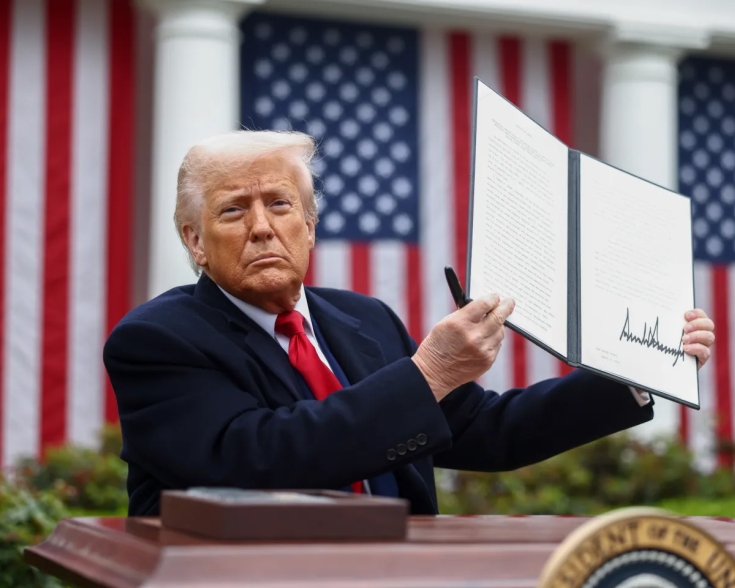
The US-ASEAN Business Council (US-ABC) is honored to have the opportunity to participate in the annual ASEAN Directors-General of Customs Meeting and hold dialogues with ASEAN DGsalbeit virtually. For over 20 years, this engagement has served as the centerpiece of the US-ABC Customs & Trade Facilitation Committee’s efforts to support a more integrated and prosperous ASEAN through efficient, secure, compliant, and competitive supply chains across the region. Following the progress made in Pillar 2 of the Indo-Pacific Economic Framework(IPEF) on enhancing the resilience of regional supply chains, the timing of this discussion is opportune for advancing ASEAN’s discussions on the pressing issue of supply chain resilience and the need for increased cooperation. Based on the region’s multi-faceted nature,consensus-based decision-making remains crucial for the freer movement of goods, services, and investments necessary for advancing regional and national economic integration and development.
Supply Chain Resilience
The economic impacts of the pandemic and conflicts have been enormous and led to considerable disruptions of supply chains. Without the close coordination between local authorities and the business community during the pandemic to ensure supply chain continuity – including the continuity of customs clearance services for essential goods to flow across borders – COVID-19 would have posed a much greater risk to ASEAN economies and communities over the past three years. Even as we move towards a post-COVID-19 world, unprecedented economic conditions amidst global uncertainty have further raised the importance of building and strengthening supply chain resilience.
Besides strengthening national and regional capacities to deter trans-border threats, the concept of supply chain resilience in Southeast Asia is evolving to construct a balance between both inward and outward-looking positions. With ASEAN strongly connected to global production networks, trade policies imposed by trading giants have the potential of interrupting the region’s intermediate trade of goods. Further crises and other macroeconomic and geopolitical developments outside ASEAN’s control could sharply disrupt the region’s growth. As a result, ASEAN customs agencies need to be able to quickly detect, respond to, and recover from unexpected events and unsettled changes. How ASEAN member states (AMS) react to the changing parameters will heavily influence their positions in global trade, investments, and value chains. End-to-end data driven supply chain integration, visibility, and transparency remain essential conditions for enhanced resilience. To maintain its position in global value chains, it is important for ASEAN governments to incorporate lessons learned from the COVID-19 pandemic to enhance the resiliency of customs and border processes.
While we applaud ASEAN Customs’ initiatives towards digital transformation, there is urgency in integrating digital technologies that streamline and automate processes across the value chain – in transportation, logistics, and customs infrastructure. ASEAN Customs should also refrain from introducing new customs duties or additional frictions that impede cross-border flows of goods and services. Reducing unnecessary costs and increasing speed to market are also significant mechanisms to reduce trade disruptions. Given this, streamlining, modernizing, and harmonizing procedures at the border enable both governments and businesses to build well-functioning and resilient supply chains.
Cooperation
Stakeholders from both public and private sectors need to work closely to build more resilience. International cooperation and effective rules-based order, resulting from a new sense of urgency to strengthen economies, call for effective partnerships among regions and will be necessary to ensure global connectivity that will foster economic growth and a more sustainable future. The roles of policymakers and implementing agencies are fundamental in creating a sound regulatory environment, formulating procedures with minimal trade disruptions, and building elasticity to external shocks. Data collected during the pandemic shows that countries operated better under stable and predictable trade policies. Governments can work closely with the private sector in capacity development of customs and other trade facilitation related infrastructure. Private sector engagement continues to be crucial in gaining a more comprehensive understanding of what industries need and formulating optimal solutions.
US-ABC applauds ASEAN’s commitment to advancing its digital transformation agenda, which is not only a prerequisite to the acceleration of economic recovery, but also a necessity for unlocking the potential of the region’s digital economy. With meaningful commitments to digitalization, ASEAN has a unique opportunity to serve as a model of digital integration and advance a digital trade community. In this regard, ASEAN should seek to establish mutually cooperative mechanisms with other players on the forefront of digital trade, including the U.S. government, IPEF member governments, and the U.S. private sector, through consultations on how the provisions and principles of trade frameworks can facilitate the cross-border movement of goods and customs data sharing between ASEAN authorities and its trading partners more seamlessly and more effectively.
US-ABC continues to work closely with the ASEAN Secretariat, ASEAN Business Advisory Council (ASEAN-BAC) and Joint Business Councils (JBC) to discuss ways to modernize customs regime in ASEAN. In the past years, US-ABC regularly participated in the consultations with the ASEAN Trade Facilitation Joint Consultative Committee (ATF-JCC), Sub-Committee on ATIGARules of Origin (SCAROO), ASEAN Single Window Steering Committee (ASW-SC), FeasibilityStudy Group on ASEAN Low Value Shipment (FSG-LVS), Coordinating Committee on ASEAN Trade in Goods Agreement (ATIGA) (CCA) and Coordinating Committee on Customs (CCC). Through these engagements, US-ABC advocated for the simplification of trade procedures(specifically for essential and critical goods), and reduction of technical barriers to trade, as well as utilization of new technology to reform trade, where appropriate.
This briefing paper intends to highlight issues and propose projects on which the US-ABC would like to work with the ASEAN Customs to further advance customs modernization for supply chain resilience in the region. The recommendations center on the following themes:
- Simplified Customs Procedures:
- Coordinated Border Management:
This represents an approach to manage borders involving customs agencies working across different portfolio boundaries in a coordinated manner to achieve shared goals and a cohesive regional response to the challenges of border management. A coordinated, streamlined, and interoperable system through initiatives such as the ASEAN Single Window reduce times and costs for operators. - Unified Approach in Customs Requirements:
Global customs requirements must be approached by ASEAN in a unified and consistent manner. Businesses need a reliable and trusted multi-lateral trading system centered on a modernized WTO that effectively implements global trade rules to ensure the resilience of regional supply chains and the promotion of foreign direct investments.
- Coordinated Border Management:
- Digital Transformation:
This involves the use of digital systems to (i) collect and safeguard customs duties, (ii) control the flow of goods and services, and (iii) secure borders from trade-related crimes. Customs agencies can and should leverage new technologies and innovations to boost their digital transformation and streamline regional trade logistics. This, in turn, can strengthen competitiveness and bolster national and regional economic growth. Supply chain resilience will not be effective without functional data components and infrastructure at the borders. - Capacity Building:
Capacity building initiatives are necessary approaches to meet the role of customs agencies in the 21st century. Such efforts reflect the need for individual AMS to take responsibility and ownership for the development and implementation of their programs. A well-designed and targeted capacity building initiative ensure that customs administrations can meet its vitally important role of implementing a range of policies and contribute to the achievement of national and regional development objectives.- Authorized Economic Operator (AEO) Dialogue:
US-ABC had the privilege to co-hosta dialogue with the Sub-Working Group on ASEAN AEO MRA (SWG-AAMRA) on May 30, 2023, especially to learn some best practices on the AEO Programs implemented by the U.S. Customs and Border Protection and the European Union Directorate-Generalfor Taxation and Customs Union (DG TAXUD). The business community sees the values of AEO Program in facilitating cross-border trade in ASEAN, in line with the objectives of the AEC Blueprint 2025 and the path towards speedy economic recovery. An effective and integrated AEO Programs among AMS would significantly ease the chokepoints at the border, thus saving cost and time to trade. - Transformative Technology in Trade Workshop:
This flagship initiative of the US-ABC Customs and Trade Facilitation Committee aims to demonstrate the application of technologies and how they can help to address the customs procedures issues at the border through modernization of the overall systems. The Council is planning to hold a follow-up workshop in Q4 this year where customs officials can explore real transformative technology solutions and conduct a deep dive into how the technology works, including through best practices sharing by other relevant customs agencies.
- Authorized Economic Operator (AEO) Dialogue:



